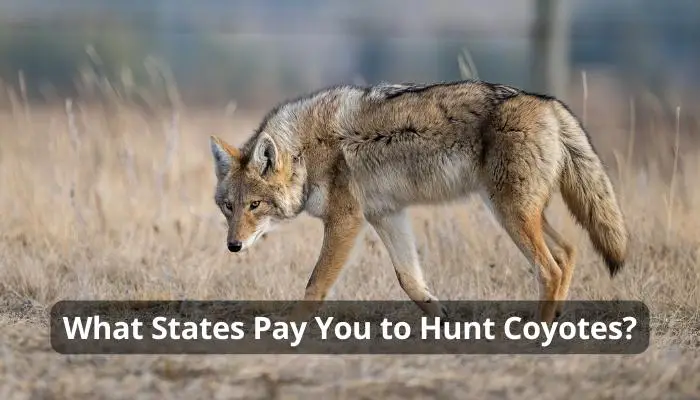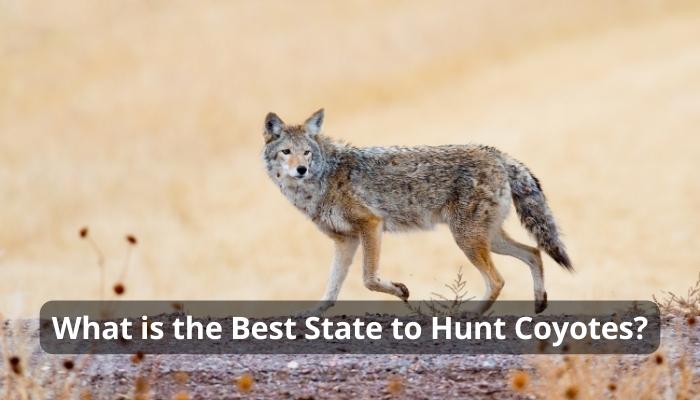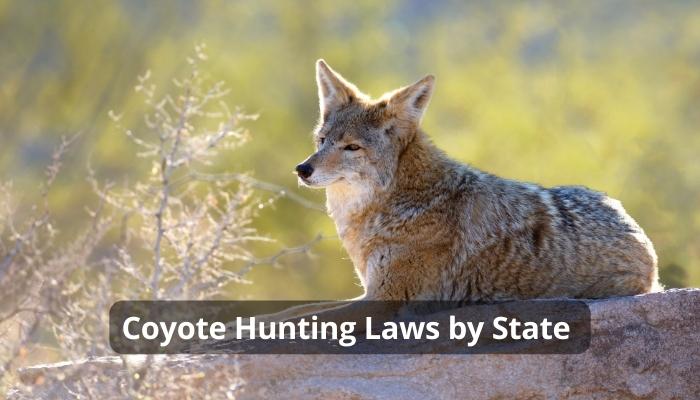Coyote hunting laws vary by state, often including restrictions on hunting methods, seasons, and licensing requirements. Each state wildlife agency sets its own regulations to manage coyote populations effectively.
Exploring the multifaceted world of coyote hunting requires understanding diverse state regulations. These laws are crafted to balance ecosystem health, game management objectives, and public safety.
Coyote hunting is both a management tool to control populations and a recreational activity for hunters.
Wildlife agencies provide specific guidelines that may address factors such as permissible weapons, daylight-hunting hours, and the use of electronic calls or dogs. Prospective hunters must prioritize staying informed on current laws to ensure legal and ethical hunting practices.
Licensing plays a fundamental role in this process, as states often use licensing systems to regulate hunter numbers and gather essential funding for conservation efforts.
As this dynamic practice continues to gain attention, staying updated on the latest regulations becomes crucial for novice and experienced hunters alike.
Contents
- 1 Coyote Hunting Regulations Overview
- 2 Coyote Hunting Laws By State Comparison
- 3 Understanding Coyote Hunting Laws By State
- 4 State-By-State Guide To Coyote Hunting Laws
- 5 Understanding The Implications Of Breaking Coyote Hunting Laws
- 6 Mastering Coyote Hunting Regulations For Success
- 7 Best Times for Coyote Hunting by Region
- 8 Land Access And Trespassing Laws
- 9 Ethical Considerations In Coyote Hunting
- 10 FAQ
- 11
- 12
- 13
- 14 Conclusion
Coyote Hunting Regulations Overview

Coyote hunting is subject to a patchwork of regulations that vary significantly from state to state. The legal requirements may include specific season dates, licensing obligations, and hunting methods.
States may enforce particular rules for night hunting, the use of electronic calls or decoys, and bag limits. Some regions might even declare coyotes as nuisance wildlife, permitting year-round hunting.
Understanding these local laws is crucial for any hunter to ensure a legal and ethical hunt. Compliance with these laws is a matter of ethical hunting practice and vital in sustainable wildlife management and conservation efforts.
It’s imperative that hunters check the most current regulations with their state’s wildlife agency before heading out.
Coyote Hunting Laws By State Comparison
Variations in coyote hunting laws are often attributed to geographic location, local ecosystem, predator populations, and hunting traditions. For example, California has more restrictive regulations due to environmental concerns, whereas states like Texas have more lenient policies reflecting their management of predator populations and property rights.
State-specific legislation can include different season dates, hunting permits, and hunting methods.
Consequently, hunters must review the regulations carefully before planning their hunting excursions to ensure compliance with state law.
|
State |
License Requirements |
Hunting Season |
Allowed Methods |
|
California |
Hunting license & permission |
Year-round restrictions apply |
Firearms, archery |
|
Texas |
Non-residents require a license |
No closed season |
Firearms, traps, calls |
|
Pennsylvania |
Hunting or further license |
July-Feb, with exceptions |
Firearms, archery, cable restraints |
Understanding Coyote Hunting Laws By State

Coyote hunting laws by state are essential to understand and follow for responsible hunters. These regulations vary across states, reflecting the need to manage coyote populations effectively.
Hunting laws aim to balance conservation efforts and ensure human and wildlife safety. Understanding the importance of these laws helps prevent overhunting and ensures sustainable coyote populations.
Authorities can tailor hunting practices to each region’s unique characteristics and needs by having state-specific regulations. These laws often consider coyote population levels, environmental impact, and human-wildlife conflicts.
Staying informed and compliant with these laws promotes ethical hunting practices and contributes to conservation efforts in each state. Hunters must research and understand the specific laws in their respective states before coyote hunting season.
State-By-State Guide To Coyote Hunting Laws

Coyote hunting laws vary from state to state, and hunters need to understand their area’s specific regulations and requirements.
In Alabama, for example, hunters must have a valid hunting license and can hunt coyotes year-round.
Alaska has different regulations, with a specific season for coyote hunting and regulations for different hunting areas.
In the Arizona game, hunters must obtain a predator-calling license to hunt coyotes, and night hunting is restricted.
In Arkansas, a hunting license is required, but there are no specific regulations regarding coyote hunting.
On the other hand, California requires a hunting license and has specific regulations regarding hunting methods and dogs.
In Colorado, hunting coyotes is allowed year-round, but it’s imperative to follow specific regulations regarding licensing and trapping guide.
Being aware of these state-by-state variations is essential for hunters to stay compliant and ensure the coyote population’s sustainability.
Key Considerations For Hunting
Coyote hunting laws vary by state, so hunters need to know the specific regulations in their area. When it comes to critical considerations for coyote hunting, understanding hunting seasons and bag limits is crucial.
Each state has designated seasons and limits to ensure coyote population conservation. Additionally, hunters must adhere to licensing and permit requirements, which may vary depending on the state.
Before heading out into the field, hunters should obtain the necessary licenses and permits to avoid legal complications. Ethical and responsible hunting is also essential for coyote hunting.
Hunters should follow ethical practices, such as shooting only within legal hours and avoiding unnecessary harm to non-target animals.
By hunting responsibly, hunters can contribute to the conservation of both the coyote population and the overall ecosystem.
Specialized Regulations
Special regulations for coyote hunting vary by state. Each state has its own coyote hunting rules. One area often addressed is hunting at night. Certain states have specific restrictions on hunting coyotes during nighttime hours.
These rules typically outline the equipment and methods prohibited during night hunting.
Hunters need to know these regulations to ensure they comply with the law. Some common prohibited methods and equipment may include artificial lights, night vision scopes, or certain firearms.
By understanding and following these specific rules, hunters can enjoy a safe and legal hunting experience while targeting coyotes.
Understanding The Implications Of Breaking Coyote Hunting Laws
Understanding the implications of breaking coyote hunting laws is crucial. Violating hunting regulations can have legal consequences. It is imperative to respect wildlife and their habitats.
By obeying these laws, we contribute to the coyote population preservation. Authorities enforce hunting regulations to maintain ecological balance, protect endangered species, and prevent unnecessary animal killing.
By knowing the coyote hunting laws in your state, you can ensure a responsible and legal hunting experience.
By doing so, we contribute to conservation efforts and help maintain our ecosystems. Let’s respect wildlife service and follow hunting laws to preserve our natural resources for future generations.
Mastering Coyote Hunting Regulations For Success
When researching coyote hunting laws by state, it’s crucial to familiarize yourself with the specific regulations of your desired hunting location. Each state has its own requirements and limitations, so research thoroughly.
Start by obtaining the necessary permits and licenses for your hunt. This typically involves contacting the appropriate state agency, such as the Department of Fish and Wildlife.
They can provide you with the specific information and paperwork you need to legally hunt coyotes in that state. Take into account any restrictions on hunting seasons, bag limits, and firearm regulations.
Understanding the rules and regulations will ensure a successful and legal hunt and contribute to coyote population conservation.
Keeping updated with the latest season dates regulations will ensure an enjoyable and responsible predator hunting experience.
Best Times for Coyote Hunting by Region
| Region | Optimal Time for Coyote Hunting |
|---|---|
| Northeast | Early morning and late afternoon |
| Midwest | Dawn and dusk |
| Southeast | Early morning and evening |
| Southwest | Nighttime, with bright moonlight |
| West Coast | Dawn and dusk |
| Mountain States | Early morning and late afternoon |
| Great Plains | Dawn and dusk |
Land Access And Trespassing Laws
Coyote hunters need to be mindful of varying land access regulations that distinguish between private and public properties.
Private land typically requires express permission from the owner for legal access, whereas public land may be more broadly accessible for hunting purposes.
Nonetheless, certain areas of public land might still necessitate specific permits or have designated hunting seasons and restrictions.
Trespassing while hunting can incur significant legal consequences, ranging from fines to criminal charges.
Respecting property boundaries is paramount, and utilizing tools such as up-to-date maps or GPS devices can help prevent unintentional infractions.
| Property Type | Access Requirement | Consequences of Trespass |
|---|---|---|
| Private Land | Permission from Owner | Fines / Criminal Charges |
| Public Land | Permits / Seasonal Restrictions | Varies by Jurisdiction |
Understanding and abiding by these laws ensures ethical hunting practices and preserves the hunters’ privilege to enjoy their sport.
Ethical Considerations In Coyote Hunting

Adhering to ethical practices in coyote hunting is vital for ensuring sustainability and respect for wildlife.
Hunters are encouraged to practice fair chase principles, aiming for quick and humane kills to minimize suffering.
It is crucial to be familiar with the animal’s behavior and habitat to make informed and respectful decisions during the hunt.
Knowledge of local regulations is essential, as states may impose specific restrictions on hunting methods.
The use of certain equipment, such as electronic calls or night vision, can be subject to limitations. As a responsible hunter, always confirm that your tactics align with state legislation and ethical standards.
| State | Humane Hunting Initiatives |
|---|---|
| California | Prohibition of night hunting and electronic calls |
| Texas | Education on humane practices encouraged, no restrictions on equipment |
| Oregon | Mandatory reporting of hunting activity to monitor population impact |
It’s of paramount importance to combine legal compliance with ethical considerations.
Being well-versed in the latest information on humane practices not only upholds the standard of conservation but also enhances the quality of the hunting experience.
FAQ
Are Coyote Hunting Licenses Required In All States?
No, coyote hunting licenses are not universally required. Each state has its own regulations, and some states may allow hunting without a license, particularly for residents. It’s crucial to check the state’s specific laws where you plan to hunt.
Which States Have Coyotes Bounty?
Texas, South Dakota, and Utah have bounty programs for coyotes.
How Many Coyotes Can You Hunt in A Year?
There is no set limit on the number of coyotes you can hunt in a year.
Can You Shoot A Coyote In Your Backyard?
Yes, you can shoot a coyote in your backyard.
What Is The Most Suitable State To Hunt Coyotes In?
The most ideal state for hunting coyotes depends on various factors such as population, regulations, and accessibility.
What Are The Hunting Seasons For Coyotes?
Coyote hunting seasons vary widely by state. Some states allow coyote hunting year-round, as coyotes are often classified as pests. Other states have specific seasons, typically set to avoid conflicts with the breeding season or other wildlife management considerations.
Can You Hunt Coyotes At Night?
Though regulations differ, many states permit night hunting for coyotes using artificial lights or night vision equipment. Some states may restrict the equipment used or the time of year when night hunting is allowed.
Is Baiting Coyotes Legal For Hunting Purposes?
Baiting laws for coyotes differ from state to state. Some states allow baiting, while others prohibit it or have strict regulations about the type of bait and how it can be used. Always consult state-specific regulations before using bait.
Conclusion
Navigating coyote hunting laws requires awareness and compliance. Each state sets its own regulations, protecting ecosystems and sportsmen alike. For current details, always check with state wildlife agencies. Embrace responsible hunting practices and stay informed for a legal, ethical experience.
“>

